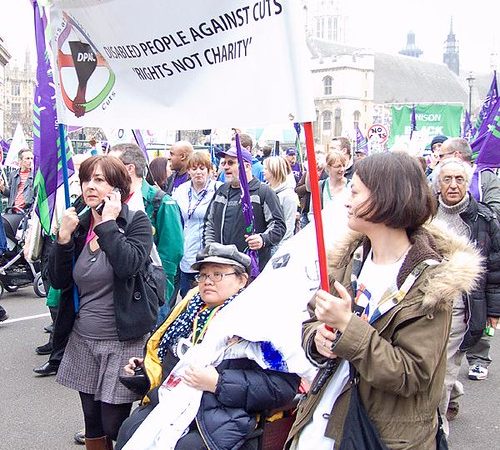'For disabled people, Britain is a country of many barriers. Our high streets, transport network, and housing system are inaccessible.'

Ben Cooper is Senior Researcher at the Fabian Society.
Prior to the government’s reshuffle, there were 13 Ministerial Disability Champions. Just 5 remain in place. The Government must ensure the voices of disabled people are heard to create a more equal country.
For disabled people, Britain is a country of many barriers. Our high streets, transport network, and housing system are inaccessible. Disabled people are twice as likely to be unemployed and looking for work as non-disabled people. The employment prospects of a disabled person with a degree are the same as a non-disabled person who left school at 16. Disability hate crime has dramatically increased over the past decade, and disabled people are more likely to be a victim of other crimes too.
As part of its National Disability Strategy, launched less than two months ago, the Government appointed 13 Ministerial Disability Champions to drive work in their departments to bring down these barriers faced by disabled people every day. They were considered vital to “ensure the needs of disabled people are at the heart of policy-making.” But, after the reshuffle, just 5 remain in post.
There have been no announcements on their replacements, or whether the Government intends to appoint new champions at all. Key departments with significant influence over the lives of disabled people do not have ministers who are currently Disability Champions, or who were when the National Strategy was released. This includes the Department for Business, Energy and Industrial Strategy, the Cabinet Office (which hosts the Disability Unit), the Home Office, and the Department of Health and Social Care.
Even if they are now appointed, it reveals the low priority afforded to disabled people around the cabinet table and highlights shortcomings with the National Strategy itself. The National Strategy was long on rhetoric, short on actual policy, and backed by little money. Its launch was accompanied by a commitment of just £4 million in new funding, or 28p per disabled person in the UK, according to a Freedom of Information request by the Disability News Service. But Ministerial Champions did suggest recognition of the need for cross-government work to tackle the challenges disabled people face, and improve lives.
Now, disabled people risk being ignored and forgotten as the Government makes big decisions about the future of the country.
Levelling up, the transition to reduced carbon emissions, and the long-term future of social care all matter to the UK’s 14.1 million disabled people. And, of course, the Government is still pushing ahead with its cut to Universal Credit which will plunge 360,000 families with at least one disabled adult into poverty, according to Fabian Society estimates. With a potentially difficult winter coming, now is not the time to be reducing the voice of disabled people in decision making: that voice needs to be amplified, now more than ever.
That is what is happening around the world with the ‘We the 15 Movement’, named after the 15 per cent of people who are disabled worldwide. The ‘We the 15 Movement’ is dedicated to placing disabled people at the heart of the political agenda and driving social inclusion, and raises the bar on disability awareness and representation – at a time when the Government appears to be going backwards.
The fate of Ministerial Disability Champions is just a small part of the picture. The government should take this opportunity to refresh its approach. As decisions are made, the Government should ensure it supports disabled people as a priority, backing it up with the necessary investment to deliver change. And Britain should set a global example on disability rights, equality and inclusion as it has so often in the past: the UK was the first country in the world to pass legislation recognising the rights of disabled people and the first country to create a Minister for Disabled People. It’s time the government built on this proud legacy, so that we can bring down the barriers and realise true equality for disabled people.
Left Foot Forward doesn't have the backing of big business or billionaires. We rely on the kind and generous support of ordinary people like you.
You can support hard-hitting journalism that holds the right to account, provides a forum for debate among progressives, and covers the stories the rest of the media ignore. Donate today.



